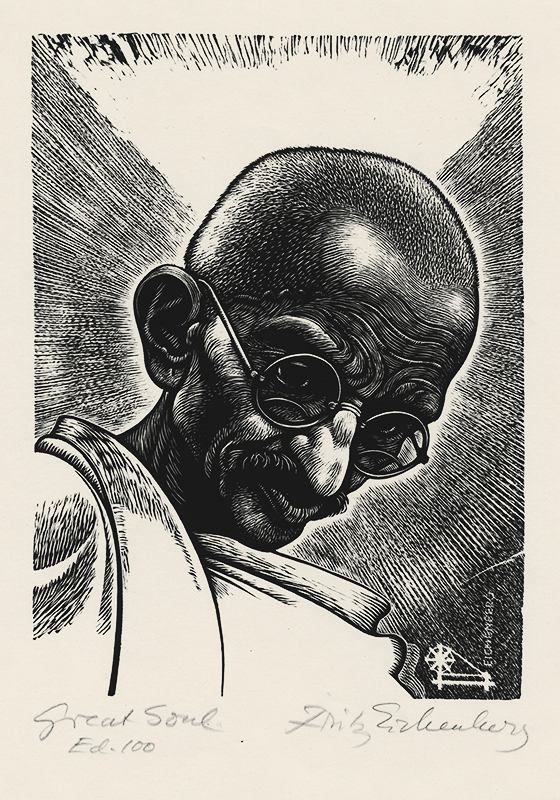Gandhi, Great Soul is a woodengraving created in 1942 by American artist Fritz Eichenberg. It is pencil signed, titled and annotated "Ed.100." This woodengraving was printed by the artist on ivory, wove Bashingwerk Parchment wove paper and the image measures 7-1/2 x 5-9/16 inches. Gandhi, Great Soul is illustrated full-page in Ellsberg’s Fritz Eichenberg Works of Mercy.
Mohandas Karamchand Gandhi was born 2 October 1869 in Porbandar, India. He was an Indian lawyer, politician, and social activist who became the leader of the nationalist movement against the British rule in India. Gandhi is internationally esteemed for his doctrine of nonviolent protest to achieve political and social protest. To the millions of fellow Indians, Gandhi was the Mahatma or "Great Soul." Gandhi was the catalyst of three of the major revolutions of the 20th century: the movements against colonialism, racism, and violence. Mahatma Gandhi was assassinated on 30 January 1948 in Delhi.
Fritz Eichenberg, printmaker, illustrator, and educator, was born in Cologne, Germany on 24 October 241901. He worked as a printer’s apprentice and studied at the Municipal School of Applied Arts in Cologne, and at the Academy of Graphic Arts in Leipzig, where he earned his M.F.A. He began his career as a graphic artist and illustrator in 1923, working for various publications and as an independent illustrator.
In 1933 with the rise of Nazi Germany, Eichenberg immigrated with his wife and family to the U.S., where they settled in New York City. He taught art at the New School for Social Research and at the Pratt Institute, and was a part of the WPA’s Federal Arts Project. He also served as the head of the art department at the University of Rhode Island and laid out the printmaking studios there. In 1956, he and Margaret Lowengrund co-founded the Pratt Graphic Arts Center in Manhattan.
Raised in a non-religious family, Eichenberg had been attracted to Taoism as a child. Following his wife’s unexpected death in 1937, he turned briefly to the practice of Zen Buddhist meditation, then joined the Religious Society of Friends in 1940. Though he remained a Quaker until his death, Eichenberg was also associated with Catholic charity work through his friendship with Dorothy Day, whom he met at a Quaker conference on religion and publishing in 1949. He frequently contributed illustrations to Day’s newspaper the Catholic Worker. Eichenberg was also a long-time contributor to The Nation, his illustrations appearing in that magazine at various times between 1930 and 1980.
Eichenberg illustrated myriad books in the United States and abroad. His commissions resulted in illustrations for more than one hundred classics and children’s books. He was a member of the Society of American Graphic Artists; the Royal Society of Arts; the Xylon International; the American Institute of Graphic Arts and served on its board directors between the years 1943 and 1946; the Philadelphia Water Color Club; and the American Artists Congress. Eichenberg was elected an Associate of the National Academy of Design in 1947 and was elevated to Academician in 1949. In 1972, he received an honorary Doctor of Fine Arts degree from Southeastern Massachusetts University; in 1973, he was named one of the Outstanding Educators of America; and, in 1974, he received an honorary Doctor of Fine Arts degree from the University of Rhode Island.
Fritz Eichenberg’s work is represented in the collections of numerous museums including, but not limited to, the Baltimore Museum of Art, Maryland; the Museum of Fine Art Boston, Massachusetts; the Brooklyn Museum, New York; the Art Institute of Chicago, Illinois; the Block Museum of Art, Northwestern University, Evanston, Illinois; the Metropolitan Museum of Art, the New York Public Library, New York; La Salle University Art Museum, the Pennsylvania Academy of the Fine Arts, and the Philadelphia Museum of Art, Pennsylvania; la Bibliothèque National de France, Paris; the Graphic Arts Collection, Princeton University, New Jersey; the Toledo Museum of Art, Ohio; and the National Gallery of Art, and the Smithsonian American Art Museum, Washington, D.C.
Fritz Eichenberg died on 30 November 1990 in Peace Dale, Rhode Island.



